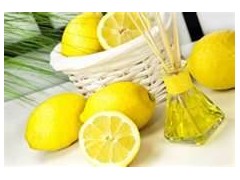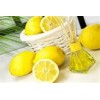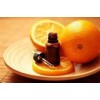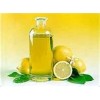Unlike many other essential oils which are extracted by distillation, lemon oil is usually manufactured in a cold-extraction process. The zest, or yellow part of the peel, is machine-pressed to squeeze out the scented oil. 1,500 lemons are needed to produce one pound (.45 kilograms) of essential oil. A type of lemon oil can also be made at home. For food flavoring and some homemade skin care products, the lemon zest can be heated in olive oil and strained, or left in olive oil for several weeks to infuse it with lemon flavor. For homemade natural cleaning products and furniture polishes, the lemon zest can be mixed with water or heated in coconut or mineral oil.
Lemon oil is a natural astringent and antiseptic, making it a popular addition to natural personal care products and cosmetics. As an astringent, it brightens skin by tightening pores and removing dead cells. Lemon oil is useful for treating oily skin, and it is an effective antibacterial against blemishes and acne. It causes photosensitivity, so sunlight should be avoided for several hours after applying products containing lemon oil to the skin. Diluted lemon oil can also be used to clean minor cuts, boils, and burns, and some mouthwashes contain lemon oil to treat oral sores or bad breath.
Many home cleaning products contain lemon oil because a lot of people associate the smell of lemons with freshness and cleanliness. Natural products containing essential lemon oil remove stains and unpleasant odors. Pure lemon oil can kill many types of bacteria, so it’s often used on furniture, floors, carpets, and countertops. Lemon oil cleaning products are usually made with the essential oil diluted in water. It doesn’t leave any residue so it does not need to be rinsed, and natural lemon oil detergents are non-toxic to children, pets, and the environment. Mixed with coconut or mineral oil, lemon oil is a common addition to furniture polish because it removes bacteria and leaves a non-waxy shine.










